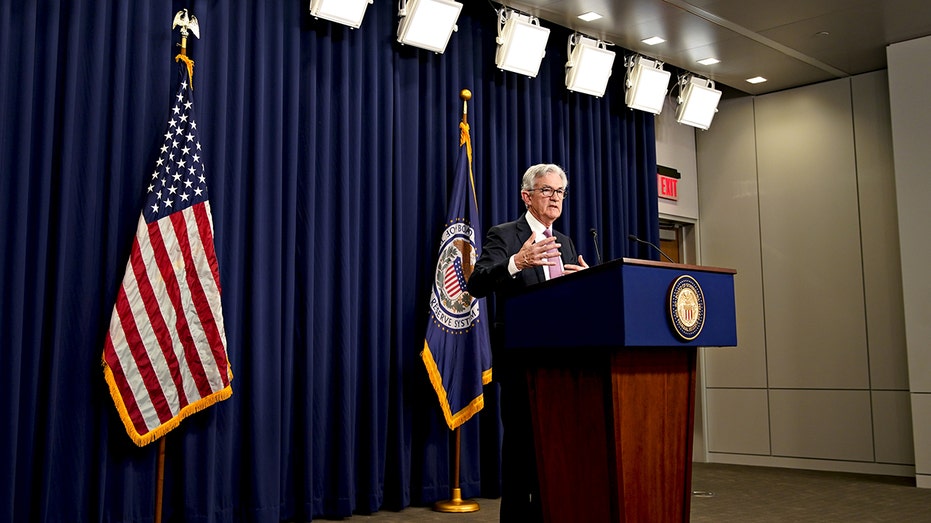Surprisingly hot August inflation data solidifies odds of another jumbo Fed rate hike
Fed could approve historic 100 basis point interest rate hike next week
Inflation report hotter than expected
FOX Business' Cheryl Casone breaks down the consumer price index report as U.S. inflation rose 0.1 percent in the month of August.
U.S. inflation remained stubbornly high in August despite hopes of a slowdown, cementing the odds of another historic, super-sized interest rate hike when Federal Reserve policymakers meet next week.
The Labor Department said Tuesday that the consumer price index, a broad measure of the price for everyday goods including gasoline, groceries and rents, rose 8.3% in August from a year ago. Prices climbed 0.1% in the one-month period from July.
Those figures were both higher than the 8.1% headline figure and 0.1% monthly decline forecast by Refinitiv economists, a worrisome sign for the Fed as it seeks to cool price gains and tame consumer demand with an aggressive interest rate hike campaign.
Even more concerning is that so-called core prices, which strip out the more volatile measurements of food and energy, re-accelerated last month: Core prices climbed 6.3% from the previous year, above the 6.1% forecast from economists, and climbed 0.6% on a monthly basis – a bigger increase than in April, May, June and July, and a troubling sign that underlying inflationary pressures in the economy remain strong.
AMERICANS' INFLATION EXPECTATIONS DROPPED AGAIN IN AUGUST, NEW YORK FED SAYS
"Today’s disappointing consumer price numbers now leave the Federal Reserve with little option but to raise interest rates by another 75 basis points at its policy meeting next week," said Desmond Lachman, an economist at the conservative American Enterprise Institute. "That in turn heightens the chances of a hard economic landing by early next year."
Investors are now betting that central bank policymakers will approve a third consecutive 75 basis point interest rate hike when they meet again on Sept. 20-21 – or go even bigger with a historic 100 basis point increase.
Traders are pricing in a 68% chance of a three-quarter percentage increase next Wednesday and a 32% chance of a full percentage hike, according to the CME Group's FedWatch tool, which tracks trading. Previously, Wall Street was evenly divided over the possibility of a 75 basis point hike, or a slightly smaller 50 basis point increase.
Chairman Jerome Powell has stressed that the central bank will take "forceful" action to achieve price stability, and some officials have already expressed support for a supersized, 75 basis point rate hike. Officials said their decision next week hinges on a slew of economic data, which over the past two months has painted a picture of a strong labor market and painfully high inflation.
BILLIONAIRE DAVID RUBENSTEIN WARNS INFLATION WILL BE 'DIFFICULT' FOR THE FED TO REDUCE

Fed Chairman Jerome Powell speaks during a news conference in Washington on May 4, 2022. (Al Drago/Bloomberg via Getty Images / Getty Images)
"The Fed has, and accepts, responsibility for price stability," Powell said last week at the Cato Institute's 40th Annual Monetary Conference. "We need to act right now – forthrightly, strongly."
The current benchmark federal funds range of 2.25% to 2.50% is around the "neutral" level, meaning that it neither supports nor restricts economic activity. But the Fed chief has signaled that a restrictive stance will almost certainly be necessary as the central bank tries to pump the brakes on the economy.
CLICK HERE TO READ MORE ON FOX BUSINESS
"Since the core rate is a better measure of broad inflationary pressures, the unexpected increase means that the Fed could get even more aggressive than previously expected," said Dan North, a senior economist at Allianz Trade North America. "And the Fed was already on an aggressive enough path that it would likely drive the economy into recession later this year or early next year."
| Ticker | Security | Last | Change | Change % |
|---|---|---|---|---|
| I:DJI | DOW JONES AVERAGES | 50115.67 | +1,206.95 | +2.47% |
| I:COMP | NASDAQ COMPOSITE INDEX | 23031.213218 | +490.63 | +2.18% |
| SP500 | S&P 500 | 6932.3 | +133.90 | +1.97% |
Stocks fell sharply on Tuesday after the surprisingly hot report on fears of an even more aggressive Fed, with the Dow Jones Industrial Average sliding 1,276 points. The S&P 500, meanwhile, tumbled 4.32% while the Nasdaq Composite sank 5.16%.





















